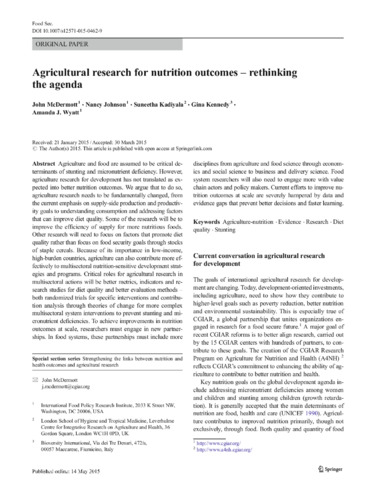Agricultural research for nutrition outcomes – rethinking the agenda
Agriculture and food are assumed to be critical determinants of stunting and micronutrient deficiency. However, agriculture research for development has not translated as expected into better nutrition outcomes. We argue that to do so, agriculture research needs to be fundamentally changed, from the current emphasis on supply-side production and productivity goals to understanding consumption and addressing factors that can improve diet quality. Some of the research will be to improve the efficiency of supply for more nutritious foods. Other research will need to focus on factors that promote diet quality rather than focus on food security goals through stocks of staple cereals. Because of its importance in low-income, high-burden countries, agriculture can also contribute more effectively to multisectoral nutrition-sensitive development strategies and programs. Critical roles for agricultural research in multisectoral actions will be better metrics, indicators and research studies for diet quality and better evaluation methods – both randomized trials for specific interventions and contribution analysis through theories of change for more complex multisectoral system interventions to prevent stunting and micronutrient deficiencies. To achieve improvements in nutrition outcomes at scale, researchers must engage in new partnerships. In food systems, these partnerships must include more disciplines from agriculture and food science through economics and social science to business and delivery science. Food system researchers will also need to engage more with value chain actors and policy makers. Current efforts to improve nutrition outcomes at scale are severely hampered by data and evidence gaps that prevent better decisions and faster learning.

